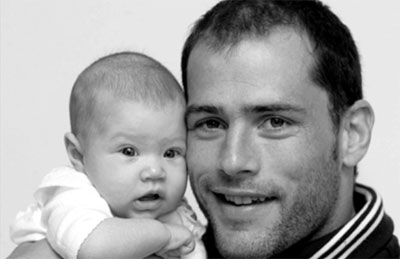|
FP:
It was - and still is - difficult to be far from home. Of
course we miss family and friends in Argentina. However
professionalism wasn't new for me. I came from Bristol and
even before that, as an amateur, I always played in a
responsible and professional way. People should realise
that, whether professionals or amateurs, we must respect
and try to fulfil players' and supporters'
expectations.
EM:
Unless you suffer an injury, you will be on the first
Argentine team to play in Croke Park in November this
year. What are your views on this?
FP:
I am aware of Croke Park's historical background and I
understand its symbolic significance to the Irish, as well
as its associations with national pride in Ireland.
Indeed, playing there will be very important for me
personally, especially now that I have so many friends
here. This is a sport that gives you a lot of rewards. But
more than anything else, rugby gives you values. They
aren't written, but they are for life, and I wish to
maintain them beyond the activity itself.
Edmundo
Murray
Profile
Felipe
Contepomi, born on 20 August 1977 to Carlos Contepomi and
María Elena Ferrante in San Isidro, Greater Buenos Aires,
is an Argentine international (Pumas) rugby union outhalf and centre, who plays club rugby for
Leinster in Ireland.
Felipe
was educated at the Irish Christian Brothers school,
Cardenal Newman, in Bolougne, Buenos Aires, where he honed
his rugby skills. His passion for rugby was inherited from
his father, Carlos, a former Puma captain and coach and
member of Buenos Aires Cricket and Rugby Club (Biei), who
himself started playing rugby at Cardenal Newman.
Initially
Felipe began his rugby career as flanker, before switching
to outhalf in the Junior Divisions, following in the
footsteps of his father, who had also been an outhalf. In
the Junior Divisons he was a member of a number teams that
won various under-age competitions, including Under-15, 16
and 19. He also played rugby Sevens at under-age level.
Following his return from the Under-19 World Cup, he
joined Club Newman’s team, alongside his twin brother
Manuel, making his debut against Deportiva Francesa.
Following the completion of his secondary schooling he
started medical school at the Universidad de Buenos Aires,
whilst continuing to play amateur rugby for Newman. Among
his achievements at senior amateur level were reaching the
national club semi-finals in 1997 and a championship. He
was appointed captain of the team in 2000.
Enticed
by his fellow Puma Agustín Pichot, he moved to the
English West Country to play professional rugby with
premiership team Bristol in 2001. In the 2001-2002 season
Bristol finished the season with the most bonus points in
the Zurich Premiership, and reached the final of the
Zurich Championship at Twickenham, securing a place in the
Heineken Cup for the 2002-2003 season. In the semi-final
against Northampton, Felipe scored all 32 points. His
tally for the season was 221 points.
The
following year, ownership problems caused by the pullout
of an investor created a crisis at the club and Bristol
were relegated. Following the 2003 Rugby World Cup, with
offers from Leinster, and English and French clubs, he
opted for Leinster as it allowed him to combine his
professional career with the resumption of his medical
studies. In his first two seasons at the club, Felipe
alternated between outhalf and centre, playing a less
influential role in the team. With the arrival of a new
head coach Michael Cheika and assistant coach David Knox,
Felipe became the indisputable outhalf. The 2005-2006
season was particularly memorable, with Leinster coming
second in the Celtic League and reaching the semi-final of
the European Heineken Cup. Felipe was the top points
scorer in both competitions. He won the Irish Rugby
Players Association ‘Best Rugby Player of the Year’
award for the 2005-2006 season, as well as the Leinster
‘Best Player of the Year’ award.
Since
making his international debut for the Pumas against Chile
in 1998, Felipe has played in three World Cups (1999, 2003
and 2007). He was one of the stars of the Argentine team
during the 2007 Rugby World Cup, helping the team to beat
Ireland and favourites France to reach the top of their
pool and reach the quarter finals of the World Cup,
subsequently winning the quarter-final against Scotland.
In the third-place play-off against France where Argentina
won 34-10, Felipe scored two tries, three conversions and
one penalty. He was the second highest points scorer in
the tournament, just behind Percy Montgomery of South
Africa. Other international honours include the captaincy
of the Pumas in their historic 25-25 draw against the
British and Irish Lions in Cardiff in May 2005.
In
October 2007, he was one of five people short-listed for
the ultimate accolade in the sport, the International
Rugby Board (IRB) ‘Player of the Year Award’, along
with team-mate Juan Martín Hernández. The award was
eventually won by Bryan Habana of South Africa. In
recognition of his outstanding performance both at
Leinster and in the Rugby World Cup, he was awarded the
‘Guinness Rugby Writers' Player of The Year Award’ in
Ireland. Not only on the sporting front was 2007 a year of
achievement for Felipe, but also on the educational front,
as he graduated with his medical degree from the Royal
College of Surgeons. The Irish current affairs magazine Village
named him as Person of the Year for 2007, not only for his
accomplishments on the rugby field, but also for his
achievement in qualifying in medicine at the same time as
being a professional player. |

